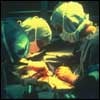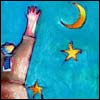The Book of Numbers1 relates how the Jews spoke out against G‑d and Moses. Their punishment was an invasion of poisonous snakes. When the Jews asked Moses to pray for them, he did, and G‑d told him to place a copper snake upon a high pole. Anyone who had been bitten by a snake would look up at the copper snake and survive.
The Mishnah2 says that it is not that the snake gave healing or death. Rather, the Jew would look up at his Father in heaven and devote his heart to him, and in this merit he would be saved.
While recognizing that healing ultimately comes from G‑d alone, we may, and must, use medicines that have healing powersSeveral hundred years later, the Jews began to ascribe special powers to the copper snake Moses had used. They began to worship it and offer sacrifices to it. In order to stop this practice, King Hezekiah crushed the snake.3 Despite the fact that as a result the Jews no longer had the snake to remind them of the miracle that had taken place, the sages approved of what Hezekiah did.4
While we must recognize that every illness is a message from G‑d and take appropriate spiritual action, trusting that healing ultimately comes from G‑d alone, at the same time, we may, and must, use medicines that have healing powers.5
Following is a collection of various laws that apply to patients and doctors.
- Since the Torah gives permission to a doctor to heal, it is mandatory for an ill person to go to a doctor to be treated, and not rely on a miracle. One who does not do so is considered to be spilling blood.6 While it is true that had the person merited, he would not have become sick in the first place, now that he is sick, he needs to seek treatment.7
- Although there are opinions that the Torah only permits a doctor to treat external wounds and not internal wounds,8 this is not the view followed by Jewish law.9
- If a doctor knows of another doctor in his area that is better able than himself to heal a particular illness, it is incumbent upon him to refer a patient with that illness to that physician.10
- The patient, in turn, should seek out the biggest expert on his condition to treat him.11
- If one has an ill person in his home, he should go to the Torah scholar in his city and ask him to pray for the ill person.12
Today, many visit, or send a note to, the Rebbe's resting place in Queens, NY, asking the Rebbe to intercede on their behalf On High. Many thousands have had their prayers miraculously answered as a result. Click here for more about the Rebbe's "Ohel," including information how to visit or email a blessing request. - Generally, a man may go to a woman doctor and vice versa. This is true even for areas of medicine such as gynecology.13 Nevertheless, the Lubavitcher Rebbe recommended that, all other things being equal, women should seek female gynecologists—for reasons of modesty as well as to benefit from the understanding and sensitivity that only fellow women can have when it comes to these matters.14
- One should go to the Torah scholar in his city and ask him to pray for the ill personOne who is swallowing a medication should not make a blessing on it if it has no taste or if it has a bitter taste. If it has a good taste, one should make the appropriate blessing before eating it, as well as an after-blessing if a sufficient quantity was consumed.15
- Before one takes medication, it is appropriate to recite the following prayer: May it be Your will that this treatment should bring healing because you are a gratuitous healer.
- After a (successful) treatment, one should say: Blessed is the healer of the sick.16
Western Medicine vs. Alternative Medicine
There is discussion amongst the poskim (halachic authorities) as to whether the Torah recognizes the validity of one system of medicine over another. Here is a story that sheds some light on this issue:17
A young man in Rechovot, Israel, had a growth on his face. The doctors confirmed that it was cancerous and insisted that it be surgically removed. He went to an alternative healer who said that he could treat it with medicinal creams. But despite the fact that he started using the creams, the tumor continued to grow. The healer said that the continued growth was a sign that the illness was coming out of his body, and that he would soon be healed. The doctors said that if he didn't cut it out, he would die.
Upon the insistence of the young man's wife, Rabbi Gluckowsky got involved and prevailed upon the young man to write to the Rebbe for advice. The young man agreed to follow the Rebbe's instructions, whatever they would be.
The Rebbe's response was that they should seek the counsel of an established halachic authority (k'atzat moreh hora'ah muvhak). After thinking the response through, they decided to consult with Rabbi Shlomo Zalman Auerbach, of blessed memory, a world-renowned halachic expert who specialized in halachic questions relating to medical matters. They spoke to Rabbi Auerbach and presented the two options of treatment.
Rabbi Auerbach said that generally the Torah allows one to choose which form of treatment one wishes to use. However, when it is a life or death matter, and the two forms of treatment are mutually exclusive, then the Torah gives primacy to the form of treatment that is used by a majority of people (in accordance with the principle of acharei rabim lehatot – follow the majority), which today would mean Western medicine.
The Rebbe's response was that they should seek the counsel of an established halachic authority As he had agreed he would, the patient accepted this decision and had the growth surgically removed. After this, the doctors recommended a course of radiation to ensure that the cancer would not spread.
On the Saturday night before his last treatment, Rabbi Gluckowsky and the young man went together to the Western Wall to thank G‑d for healing him. There they saw Rabbi Auerbach. They approached him and thanked him for his counsel, and told him that there was only one radiation treatment left and then the patient would be considered healed.
Rabbi Auerbach, who generally never acted with any airs of being a rebbe or tzaddik, took the young man's hand in his two hands and said, "Men darf nisht, men darf nisht" (it's not necessary, it's not necessary). And indeed it wasn't.






Join the Discussion